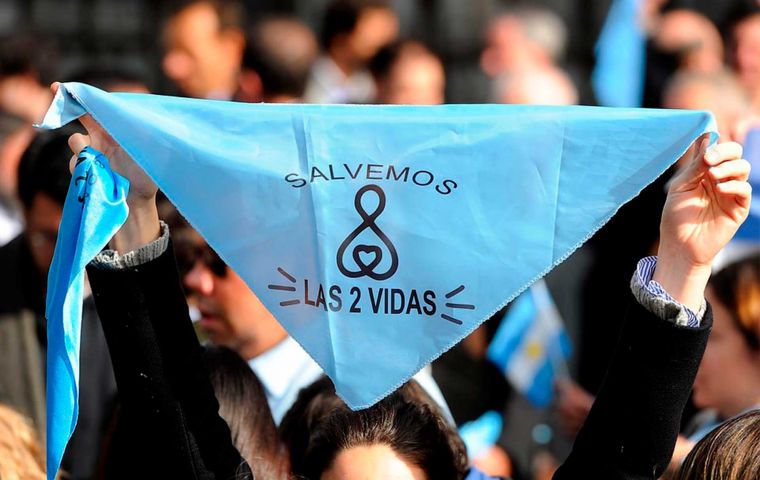MercoPress. South Atlantic News Agency
Argentina pro-life lobbies ready for a major battle when the promised abortion bill is sent to Congress
 A 2018 draft bill decriminalized abortion and given anyone who becomes pregnant access to abortion for whatever reason in the first 14 weeks of pregnancy
A 2018 draft bill decriminalized abortion and given anyone who becomes pregnant access to abortion for whatever reason in the first 14 weeks of pregnancy The Catholic Church, some lawmakers, and the pro-life lobbies are ready for a major battle when the current Argentine government is expected to send a bill to legalize abortion. This follows statements from president Alberto Fernandez pledging to the green scarves movement, who strongly support the initiative that the long-delayed bill will be taken up for consideration soon.
Martín Zeballos Ayerza, who represents pro-life organizations in Argentina’s Senate, said that the Catholic bishops of the country issued a statement this past week in response to rumors regarding the abortion bill.
“Just as the dignity of life and the promotion of human rights are central concepts in an authentically democratic agenda, the general public health situation…makes any attempt to introduce and discuss a law like this untenable and inappropriate,” the bishops’ conference said in a statement last week.
Argentine law allows certain exceptions to an otherwise blanket prohibition against abortion: when a pregnancy endangers the life or health of a woman, or when it results from rape. A 2018 draft bill would have decriminalized abortion and given anyone who becomes pregnant access to abortion for whatever reason in the first 14 weeks of pregnancy. After 14 weeks, the exceptions model of the current law would have remained in force, but with an additional exception: when the unborn child has serious complications “incompatible with life.”
The bill passed in the Chamber of Deputies but was narrowly rejected in the Senate.
“They have been trying to push for abortion for a while,” said Neydy Casillas, senior counsel at Alliance Defending Freedom, in a recent interview. “There was a radical proposal in which they were not only legalizing it but forbidding conscientious objection for anyone who could be involved in abortion.”
When Alberto Fernández became president last year, he promised to introduce a bill. It was about to be introduced in March when lockdowns due to the coronavirus pandemic put it on hold.
The proposal has been actively promoted by a number of international organizations, including Human Rights Watch, which issued a report on the state of abortion in Argentina earlier this year.
“The decriminalization of abortion in Argentina is essential for pregnant people to fully exercise their sexual and reproductive rights,” HRW said. “Authoritative interpretations of international human rights law establish that denying women and girls access to abortion jeopardizes a range of human rights, including the rights to life, health, freedom from cruel, inhuman and degrading treatment, physical integrity, nondiscrimination and equality, privacy, information, and the right to decide the number and spacing of children.”
Zeballos speculates that the bill might not be introduced before November 3, when it might become clear who wins the American presidential election.
“I think it matters to them because a lot of funds for Planned Parenthood and Amnesty International, organizations which were behind the project of the law in 2018, and certainly promoting it again. … I think they’ve survived for four years with reduced funds,” he said in reference to the Trump Administration’s cutting of funds for Planned Parenthood, “and I don’t know if they will be so comfortable with four more years of cutting budgets. So I think they’re waiting for what would be good news for them to come out stronger.”
But pro-life activist Christine de Marcellus Vollmer, who is based in Venezuela, was less than optimistic. “I’m very much afraid they will be successful in changing the abortion law,” she said in an interview.
“Once you have these things, it’s extremely difficult to stop it. It starts at 12 weeks and two doctors and blah blah blah, and before you know it it’s at nine months. We’ve seen this in one country after another.”




Top Comments
Disclaimer & comment rulesCommenting for this story is now closed.
If you have a Facebook account, become a fan and comment on our Facebook Page!